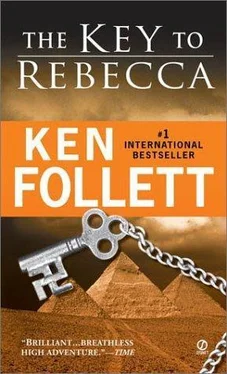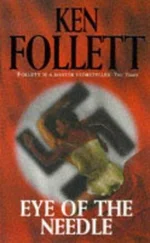Ken Follett - The Key to Rebecca
Здесь есть возможность читать онлайн «Ken Follett - The Key to Rebecca» весь текст электронной книги совершенно бесплатно (целиком полную версию без сокращений). В некоторых случаях можно слушать аудио, скачать через торрент в формате fb2 и присутствует краткое содержание. Жанр: Шпионский детектив, на английском языке. Описание произведения, (предисловие) а так же отзывы посетителей доступны на портале библиотеки ЛибКат.
- Название:The Key to Rebecca
- Автор:
- Жанр:
- Год:неизвестен
- ISBN:нет данных
- Рейтинг книги:4 / 5. Голосов: 1
-
Избранное:Добавить в избранное
- Отзывы:
-
Ваша оценка:
- 80
- 1
- 2
- 3
- 4
- 5
The Key to Rebecca: краткое содержание, описание и аннотация
Предлагаем к чтению аннотацию, описание, краткое содержание или предисловие (зависит от того, что написал сам автор книги «The Key to Rebecca»). Если вы не нашли необходимую информацию о книге — напишите в комментариях, мы постараемся отыскать её.
The Key to Rebecca — читать онлайн бесплатно полную книгу (весь текст) целиком
Ниже представлен текст книги, разбитый по страницам. Система сохранения места последней прочитанной страницы, позволяет с удобством читать онлайн бесплатно книгу «The Key to Rebecca», без необходимости каждый раз заново искать на чём Вы остановились. Поставьте закладку, и сможете в любой момент перейти на страницу, на которой закончили чтение.
Интервал:
Закладка:
Sonja lowered her eyes. “She left, the bitch.”
Wolff set down the glass, then he put both hands to Sonja’s neck. She looked up at him, unmoving. With his thumbs under her chin he forced her to stand. “I’ll find another Fawzi for us,” he said softly. He saw that her eyes were suddenly moist. His hands moved over the silk robe, descending her body, stroking her flanks. “I’m the only one who understands what you need.” He lowered his mouth to hers, took her lip between his teeth, and bit until he tasted blood.
Sonja closed her eyes. “I hate you,” she moaned.
In the cool of the evening Wolff walked along the towpath beside the Nile toward the houseboat. The sores had gone from his face and his bowels were back to normal. He wore a new white suit, and he carried two bags full of his favorite groceries.
The island suburb of Zamalek was quiet and peaceful. The raucous noise of central Cairo could be heard only faintly across a wide stretch of water. The calm, muddy river lapped gently against the houseboats lined along the bank. The boats, all shapes and sizes, gaily painted and luxuriously fitted out, looked pretty in the late sunshine.
Sonja’s was smaller and more richly furnished than most. A plank led from the path to the top deck, which was open to the breeze but shaded from the sun by a green-and-white-striped canopy. Wolff boarded the boat and went down the ladder to the interior. It was crowded with furniture: chairs and divans and tables and cabinets full of knickknacks. There was a tiny kitchen in the prow. Floor-to-ceiling curtains of maroon velvet divided the space in two, closing off the bedroom. Beyond the bedroom, in the stern, was a bathroom.
Sonja was sitting on a cushion painting her toenails. It was extraordinary how slovenly she could look, Wolff thought. She wore a grubby cotton dress, her face looked drawn and her hair was uncombed. In half an hour, when she left for the Cha-Cha Club, she would look like a dream.
Wolff put his bags on a table and began to take things out. “French champagne ... English marmalade ... German sausage ... quail’s eggs ... Scotch salmon ...”
Sonja looked up, astonished. “Nobody can find things like that—there’s a war on.”
Wolff smiled. “There’s a little Greek grocer in Qulali who remembers a good customer.”
“Is he safe?”
“He doesn’t know where I’m living—and besides, his shop is the only place in North Africa where you can get caviar.”
She came across and dipped into a bag. “Caviar!” She took the lid off the jar and began to eat with her fingers. “I haven’t had caviar since—”
“Since I went away,” Wolff finished. He put a bottle of champagne in the icebox. “If you wait a few minutes you can have cold champagne with it.”
“I can’t wait.”
“You never can.” He took an English-language newspaper out of one of the bags and began to look through it. It was a rotten paper, full of press releases, its war news censored more heavily than the BBC broadcasts which everyone listened to, its local reporting even worse—it was illegal to print speeches by the official Egyptian opposition politicians. “Still nothing about me in here,” Wolff said. He had told Sonja of the events in Assyut.
“They’re always late with the news,” she said through a mouthful of caviar.
“It’s not that. If they report the murder they need to say what the motive was—or, if they don’t, people will guess. The British don’t want people to suspect that the Germans have spies in Egypt. It looks bad.”
She went into the bedroom to change. She called through the curtain: “Does that mean they’ve stopped looking for you?”
“No. I saw Abdullah in the souk. He says the Egyptian police aren’t really interested, but there’s a Major Vandam who’s keeping the pressure on.” Wolff put down the newspaper, frowning. He would have liked to know whether Vandam was the officer who had broken into the Villa les Oliviers. He wished he had been able to look more closely at that man, but from across the street the officer’s face, shaded by the peaked cap, had been a dark blank.
Sonja said: “How does Abdullah know?”
“I don’t know.” Wolff shrugged. “He’s a thief, he hears things.” He went to the icebox and took out the bottle. It was not really cold enough, but he was thirsty. He poured two glasses. Sonja came out, dressed: as he had anticipated, she was transformed, her hair perfect, her face lightly but cleverly made up, wearing a sheer cherry-red dress and matching shoes.
A couple of minutes later there were footsteps on the gangplank and a knock at the hatch. Sonja’s taxi had arrived. She drained her glass and left. They did not say hello and good-bye to one another.
Wolff went to the cupboard where he kept the radio. He took out the English novel and the sheet of paper bearing the key to the code. He studied the key. Today was May 28. He had to add 42—the year—to 28 to arrive at the page number in the novel which he must use to encode his message. May was the fifth month, so every fifth letter on the page would be discounted.
He decided to send: HAVE ARRIVED. CHECKING IN. ACKNOWLEDGE. Beginning at the top of page 70 of the book, he looked along the line of print for the letter H. It was the tenth character, discounting every fifth letter. In his code it would therefore be represented by the tenth letter of the alphabet, J. Next he needed an A. In the book, the third letter after the H was an A. The A of HAVE would therefore be represented by the third letter of the alphabet, C. There were special ways of dealing with rare letters, like X.
This type of code was a variation on the one-time pad, the only kind of code which was unbreakable in theory and in practice. To decode the message a listener had to have both the book and the key.
When he had encoded his message he looked at his watch. He was to transmit at midnight. He had a couple of hours before he heeded to warm up the radio. He poured another glass of champagne and decided to finish the caviar. He found a spoon and picked up the pot. It was empty. Sonja had eaten it all.
The runway was a strip of desert hastily cleared of camel thorn and large rocks. Rommel looked down as the ground came up to meet him. The Storch, a light aircraft used by German commanders for short trips around the battlefield, came down like a fly, its wheels on the ends of long, spindly front legs. The plane stopped and Rommel jumped out.
The heat hit him first, then the dust. It had been relatively cool, up in the sky; now he felt as if he had stepped into a furnace. He began to perspire immediately. As soon as he breathed in, a thin layer of sand coated his lips and the end of his tongue. A fly settled on his big nose, and he brushed it away.
Von Mellenthin, Rommel’s Ic—intelligence officer—ran toward him across the sand, his high boots kicking up dusty clouds. He looked agitated. “Kesselring’s here,” he said.
“ Auch , das noch ,” said Rommel. “That’s all I need.”
Kesselring, the smiling field marshal, represented everything Rommel disliked in the German “armed forces. He was a General Staff officer, and Rommel hated the General Staff; he was a founder of the Luftwaffe, which had let Rommel down so often in the desert war; and he was—worst of all—a snob. One of his acid comments had gotten back to Rommel. Complaining that Rommel was rude to his subordinate officers, Kesselring had said: ”It might be worth speaking to him about it, were it not that he’s a Wuerttemberger.” Wuerttemberg was the provincial state where Rommel was born, and the remark epitomized the prejudice Rommel had been fighting all his career.
He stumped across the sand toward the command vehicle, with von Mellenthin in tow. “General Cruewell has been captured,” von Mellenthin said. “I had to ask Kesselring to take over. He’s spent the afternoon trying to find out where you were.”
Читать дальшеИнтервал:
Закладка:
Похожие книги на «The Key to Rebecca»
Представляем Вашему вниманию похожие книги на «The Key to Rebecca» списком для выбора. Мы отобрали схожую по названию и смыслу литературу в надежде предоставить читателям больше вариантов отыскать новые, интересные, ещё непрочитанные произведения.
Обсуждение, отзывы о книге «The Key to Rebecca» и просто собственные мнения читателей. Оставьте ваши комментарии, напишите, что Вы думаете о произведении, его смысле или главных героях. Укажите что конкретно понравилось, а что нет, и почему Вы так считаете.












